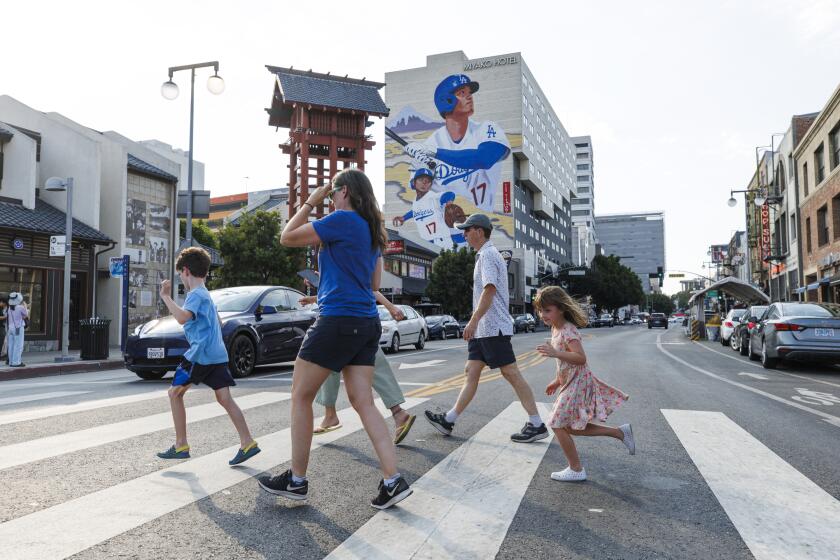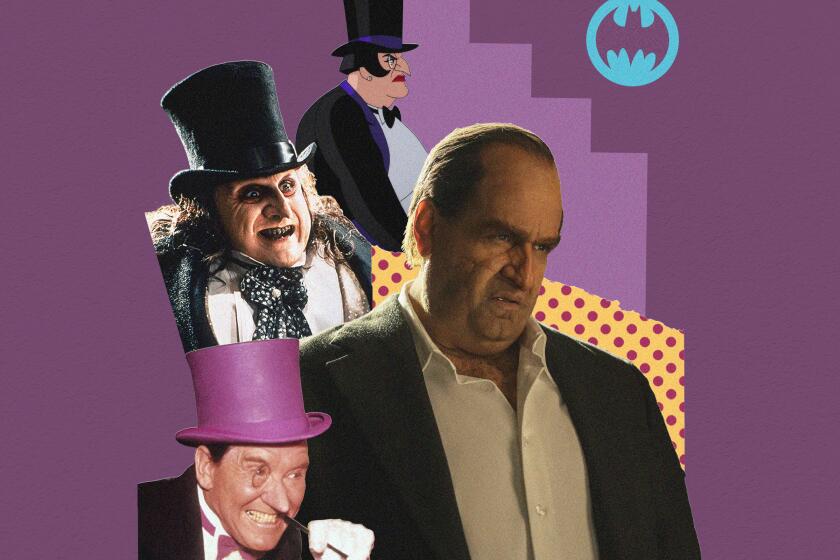The Player: Do I really need a murder simulation? The video game revolution is thrilling, but potentially unsettling
To those who doubt we are on the eve of a new virtual reality era, Palmer Luckey, the 23-year-old founder of Oculus and inventor of the Rift headset, had one message at this week’s Game Developers Conference: “You’re going to have to eat your words.”
There was no mistaking that VR was the darling of the San Francisco conference, the industry’s largest professional gathering, which is now in its 30th year. Sony revealed that its PlayStation VR, an accessory to the PlayStation 4, will hit the market in October, and Luckey’s Rift headsets begin shipping later this month.
See more of Entertainment’s top stories on Facebook >>
“I believe there’s a sizable number of you who still don’t believe in virtual reality,” the Long Beach native said at a Wednesday morning keynote. “That’s OK. I think you’re going to be proven wrong.”
But even in this dawning of the VR era, the video game industry is in need of a revolution.
Many at the GDC’s Moscone Center steered the conversation away from new technologies and wondered whether before the industry graduates to new frontiers if it has fully conquered its last ones.
Writer Meg Jayanth essentially put the industry on blast for a lack of diversity in its characters and stories. For too long, mainstream game developers have taken the stance that their projects are entertainment rather than social commentary. But every creative work, she argued, makes a political statement.
Games that go out of their way to avoid modern realities may be some of the most dangerous, she said, pandering to players by concocting a comfortable and false fantasy universe.
“Sometimes it feels like we’re trying as an industry not to see the elephant in the room — that we actually invented a whole herd of magical dragons over them,” she said. “Now we’ve got all these magical dragon stories. Yes, they’re cool, and maybe they’re easier to tell, but can we please talk about the elephant now? ... We deserve our lives to be represented.”
It’s time to grow up, said Jayanth.
The writer of the acclaimed indie mobile game “80 Days,” Jayanth referenced the recent Ubisoft blockbuster “Tom Clancy’s the Division,” a game in which a deadly epidemic sends New York into chaos.
Though it boasts a diverse cast, Jayanth said the game was an opportunity missed, especially as she watched a black character stroll through Manhattan “seemingly blasé about holding a gun.”
“I can’t watch that without thinking about Black Lives Matter and about the protests in the recent months and years,” she said. “I really wish the game acknowledged that in some way, otherwise it almost feels as though it’s accidentally saying that what we need to achieve post-racial utopia in New York is a viral apocalypse that’s going to break down society.”
Though the game taking top prize at GDC’s annual awards ceremony the past two years has been, essentially, a variation of the magical dragon story — “Middle-earth: Shadow of Mordor” last year and “The Witcher 3: Wild Hunt” this year — it was clear at the conference that there was a hunger for a broader range of game experiences.
Even Luckey copped to being a bit bored in recent years.
“For a long time, games were a little bit in a rut,” he said. “I don’t say this as a game developer. I’m a really young guy. This is just as a gamer. I felt like things were really stuck in a rut. The games coming out every year were roughly the same as games that came out the year before.”
Many at GDC argued that the industry was only going to get smarter and odder. They often pointed to virtual reality, which requires game design to be rethought. What works on a television screen often doesn’t work in a fully immersive space. Movement done wrong in a VR universe can easily lead to motion sickness, which, designers argued, will force creators to rethink interactivity.
“You have an amazing ability to reproduce human emotion in VR, and limited ability to do locomotion without making the viewer sick,” said Tim Sweeney, who leads Epic Games. “So it makes sense that you’d spend a lot more time statically in a set scene interacting.”
Driving many VR experiences at GDC was Epic’s Unreal Engine. No doubt, they were impressive, especially Lucasfilm’s “Trials on Tatooine,” an experiment that will trick you into believing you are holding a lightsaber (they feel surprisingly light). Players, as a young, not-yet-evil Kylo Ren, will stand before the Millennium Falcon as it lands, and deflect blaster fire from Stormtroopers.
Others, however, felt a bit more hazardous.
Epic’s “Bullet Train,” for instance, brings the first-person shooter to virtual reality, and I’m not so sure it’s a good idea. It felt bracingly real, as a life-size-looking army descended upon me in a subway station. While technically players are shooting robots, they’re humanoid, and the curvature of the Rift’s motion controls created the illusion of actually holding a gun.
I broke a sweat, and in moments was dodging oncoming bullets while wildly swinging two semi-automatic weapons. I nearly cursed a few times, and aimed for the heads. When it was all done, I was shaken. Did I really need a murder simulator?
Afterward, I told Epic’s Sweeney that “Bullet Train” was so technically impressive that it made me uncomfortable.
“That’s an area that all video game developers are going to have to consider,” he conceded. “How realistic do you want to make games? Is human-on-human violence appropriate in these sorts of situations?”
Others at GDC were grappling with similar issues. Developer and designer Jesse Schell worried on another panel that it was only a matter of time before “Bullet Train” was blamed for a mass shooting, and researcher and developer Kimberly Voll, one of the most passionate proponents of the new medium at GDC, said in one of her talks that she was not without concerns.
“It is an incredibly intense experience, and we are working very hard to make it real,” she said of VR. “So as an extension of making it real, that means things that happen in there are going to have deeper, more long-lasting effects, and we need to be very, very careful about that.”
Sweeney, speaking of his team’s creation, may have put it best. “It will be a Pandora’s box. People will have the capability of creating experiences that we will have to ask, ‘Do we as an industry want to do this?’ What are the boundaries?”
A brave new video game world is about to arrive. Is the industry, one that’s only a few decades old, mature enough to handle it?
Follow me @toddmartens
More to Read
The biggest entertainment stories
Get our big stories about Hollywood, film, television, music, arts, culture and more right in your inbox as soon as they publish.
You may occasionally receive promotional content from the Los Angeles Times.











